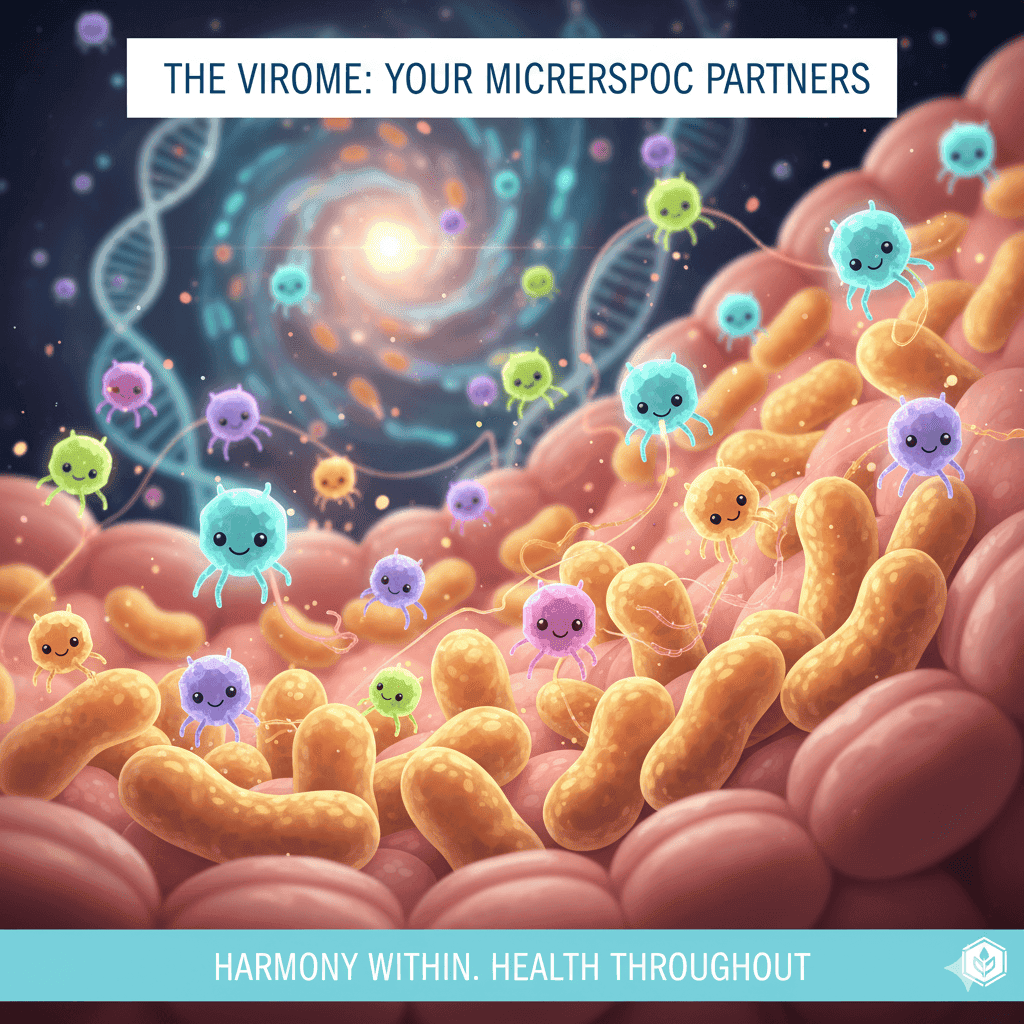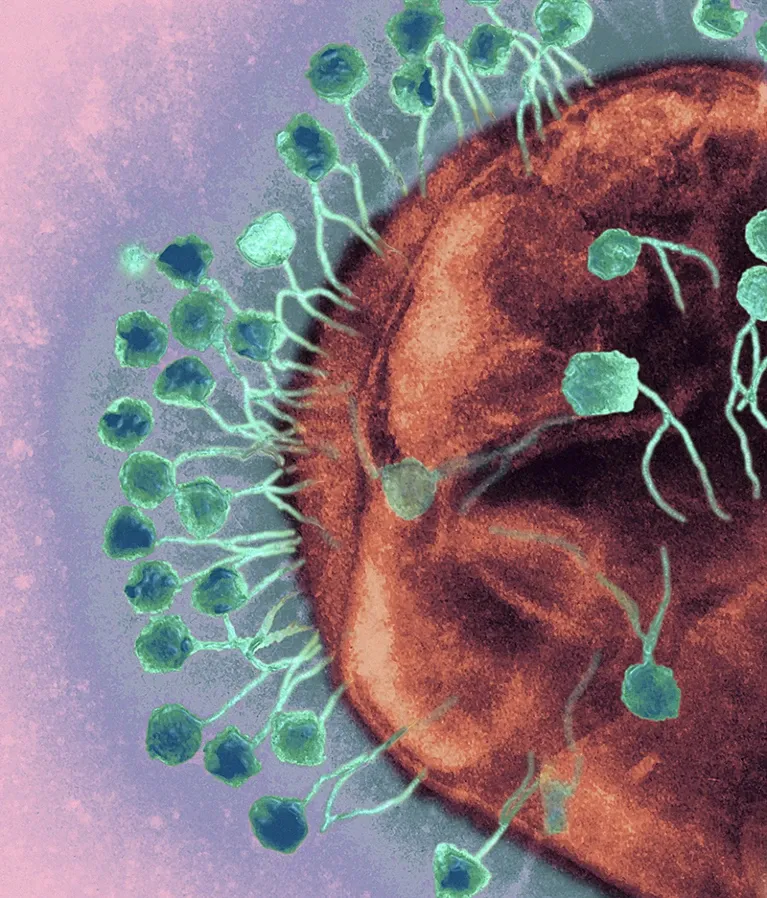Virome : The Hidden World - Part I
A transmission electron micrograph shows bacteriophages (turquoise) attacking a bacterial cell (red).
For years, when we talked about gut health, the conversation was all about bacteria. We saw our gut microbiome as this bustling city of beneficial bacteria, working tirelessly for our health. But what if there's an even more powerful, mysterious force at play? What if the real story is far more complex and involves a cast of characters we've only just begun to understand?
Get ready to meet the virome—the entire universe of viruses that lives inside us. It might sound scary, but these viruses are not the enemies you think they are. In fact, they are the silent architects of our gut ecosystem, and we're just beginning to unlock their incredible influence on everything from our digestion to our immune system.
Your Gut’s Secret Agents: Bacteriophages
The rockstars of the gut virome are bacteriophages, or "phages." Don't let the name intimidate you! These are tiny viruses with a fascinating mission: they only infect and replicate inside bacteria. Think of them as the natural "police force" for our gut's bacterial communities, ensuring no single group gets too powerful. They are completely harmless to human cells, and their existence is a testament to the intricate balance of life within us.
Ready for a mind-blowing fact? The ratio of phages to bacteria in your gut is roughly 100-to-1! That's right—for every single bacterium, there are hundreds of viruses working to keep things in check, making them the most abundant biological entities in your body (Nature, 2024). This staggering number highlights just how central they are to the entire system.
The vast majority of these viruses are completely new to science, a hidden world we're only just beginning to map. They are often called the "dark matter" of the gut virome, holding secrets that could revolutionize our understanding of health and disease (ScienceDirect, 2025).
To get a better grasp of just how phages work, check out this great video:
Kurzgesagt - In a Nutshell: Viruses - Are They Alive?
How Phages Shape Your Gut
Phages aren't just passive residents; they're constantly shaping your gut environment. They follow a brilliant strategy called "kill-the-winner," where they target the most dominant bacterial species. This clever tactic promotes diversity, preventing any one type of bacteria from taking over and maintaining a healthy balance. It's a natural form of population control that keeps the entire ecosystem thriving.
But that's not all. Phages also act as genetic couriers, a process called transduction. It's like a biological express delivery service that transfers genes between bacteria. This is a crucial way for our gut community to quickly adapt, for instance, by sharing traits that help them break down the complex fibers from our diet more efficiently (Microbiome, 2025). This constant genetic sharing allows the entire gut community to evolve in real-time based on what we eat, acting as a critical feedback loop for our health.
This video gives you an amazing visual of how this all works:
Kurzgesagt - In a Nutshell: The Human Microbiome
The Virome and Your Health
When the delicate balance of the virome is disturbed, it can lead to a domino effect of health issues, often contributing to chronic conditions.
- Inflammatory Bowel Disease (IBD): In patients with IBD, the gut virome is significantly altered. Studies show an increase in "lytic" phages that actively destroy beneficial bacteria. This imbalance contributes to the chronic inflammation seen in IBD by weakening the gut lining and disrupting the microbial harmony (ScienceDirect, 2025).
- Colorectal Cancer & Other Diseases: A dysregulated virome has been linked to a higher risk of colorectal cancer, and even plays a role in conditions like Non-Alcoholic Fatty Liver Disease (NAFLD) and celiac disease (ScienceDirect, 2025; BMC Medicine, 2025; WJGnet, 2024). It’s becoming clear that the virome is a key piece in the complex puzzle of what drives these diseases.
- Systemic Impact: The virome's influence extends far beyond the gut itself. An imbalanced virome is associated with systemic inflammation, which is a low-grade, chronic inflammation throughout the body. This can contribute to metabolic disorders, and even the onset of Type 1 diabetes (Nature, 2024). It's a powerful reminder that the gut virome has a far-reaching influence on our entire body's well-being.
This video does an excellent job of simplifying the connection between viruses and disease:
Kurzgesagt - In a Nutshell: Can Viruses Be Cured?
The Future is Viral
Understanding the virome isn't just about cool new discoveries; it's about creating powerful new tools to fight disease and improve health.
- Phage Therapy: Phages offer a highly precise alternative to antibiotics. We can use them to target and eliminate specific harmful bacteria without causing collateral damage to our beneficial bacteria. This precision makes them a promising frontier in personalized medicine.
- Virome as a Diagnostic Tool: The unique composition of a person's gut virome can serve as a powerful biomarker for various diseases. This could allow for earlier detection and more personalized treatment strategies by simply analyzing a person's viral signature.
The virome is a complex and challenging frontier to study, with so much still left to learn. The sheer number and diversity of these viruses make them a difficult subject to map, but the potential for new, virus-based therapies is immense. We are truly on the cusp of a revolution in medicine that will leverage our viral partners for our own health, moving beyond the familiar world of bacteria to explore a whole new universe within us.

-Rohini Prasad
References
Lathakumari, R. H., Vajravelu, L. K., Gopinathan, A., Vimala, P. B., Panneerselvam, V., Ravi, S. S. S., & Thulukanam, J. (2025). The gut virome and human health: From diversity to personalized medicine. Engineering microbiology, 5(1), 100191. https://doi.org/10.1016/j.engmic.2025.100191
Wu, Y., Cheng, R., Lin, H., Li, L., Jia, Y., Philips, A., Zuo, T., & Zhang, H. (2025). Gut virome and its implications in the pathogenesis and therapeutics of inflammatory bowel disease. BMC medicine, 23(1), 183. https://doi.org/10.1186/s12916-025-04016-y
Feng, Z., Burgermeister, E., Philips, A., Zuo, T., & Wen, W. (2025). The gut virome in association with the bacteriome in gastrointestinal diseases and beyond: roles, mechanisms, and clinical applications. Precision clinical medicine, 8(2), pbaf010. https://doi.org/10.1093/pcmedi/pbaf010
Yu, M., Chu, Y., Wang, Y., Mo, L., Tan, X., Guo, S., Yuan, S., & Ma, Y. (2025). Metagenomic analysis reveals gut phage diversity across three mammalian models. Microbiome, 13(1), 146. https://doi.org/10.1186/s40168-025-02144-4
Fernández-Pato, A., Sinha, T., Garmaeva, S., Gulyaeva, A., Kuzub, N., Roux, S., Fu, J., Kurilshikov, A., & Zhernakova, A. (2025). Early-life development of the gut virome and plasmidome: A longitudinal study in cesarean-born infants. Cell reports, 44(6), 115731. https://doi.org/10.1016/j.celrep.2025.115731
Wang, X., Dong, Q., Huang, P., Yang, S., Gao, M., Zhang, C., Zhang, C., Deng, Y., Huang, Z., Ma, B., Jiao, Y., Zhou, Y., Wu, T., Zou, H., Shi, J., Sheng, Y., Wang, Y., Consortium, C., Tang, L., Hu, S., … Chen, L. (2025). The genetic diversity and populational specificity of the human gut virome at single-nucleotide resolution. Microbiome, 13(1), 188. https://doi.org/10.1186/s40168-025-02185-9
Hetta, H. F., Ahmed, R., Ramadan, Y. N., Fathy, H., Khorshid, M., Mabrouk, M. M., & Hashem, M. (2025). Gut virome: New key players in the pathogenesis of inflammatory bowel disease. World journal of methodology, 15(2), 92592. https://doi.org/10.5662/wjm.v15.i2.92592
King, A. (2024). Hidden players: the bacteria-killing viruses of the gut microbiome. Nature. https://doi.org/10.1038/d41586-024-03532-w
